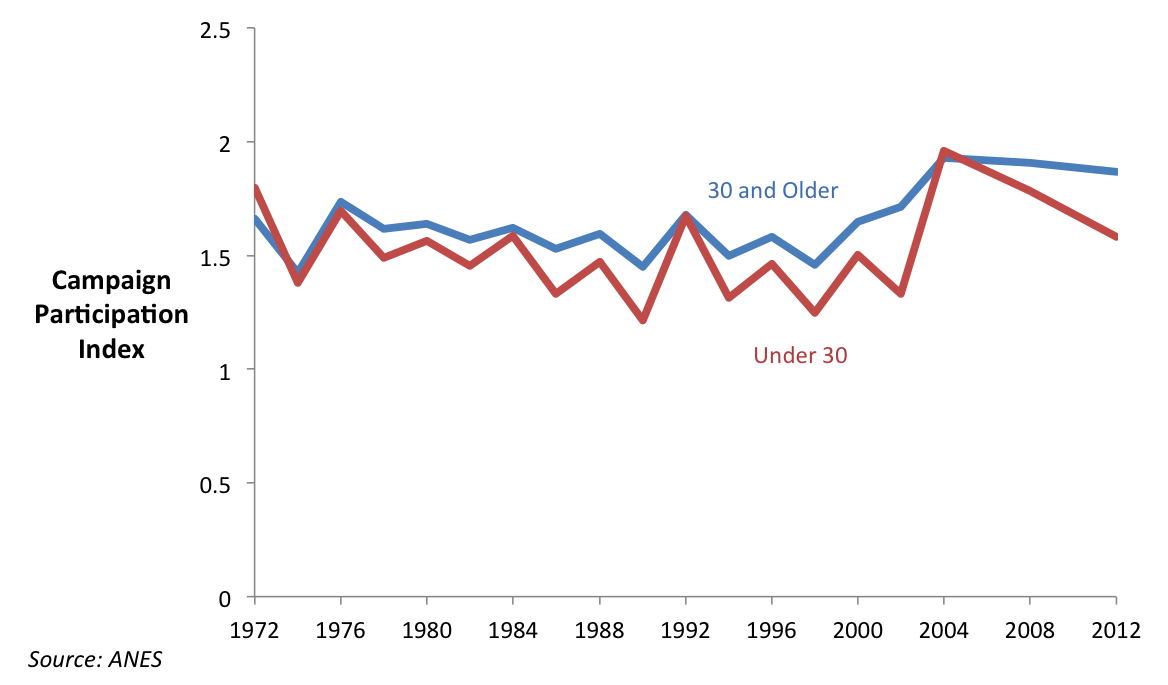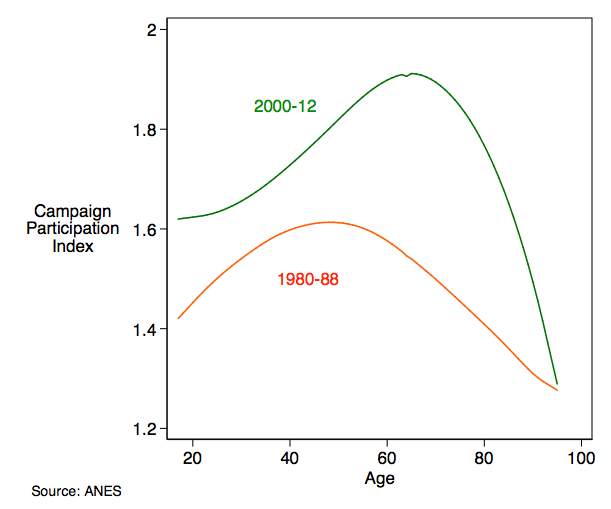Last week at the Monkey Cage, Shauna Shames detailed some of her recent research on the political beliefs and interests of Millennials. Her findings suggest that young voters (those aged 18 to 29) have a strongly negative opinion of politics, would prefer to see all members of Congress kicked out of office, and have little to no interest in running for office.
It’s an interesting read, filled with compelling quotes by young voters that give an idea of the Millennial mindset with regards to politics. Before we use these findings to dismiss today’s young people as disengaged and cynical, however, it’s worth asking two key questions. First, are their attitudes different from those of individuals over 30? After all, only a small minority of Americans in any age group seeks to run for office or gets involved with politics to any degree beyond voting, and even that one’s a stretch. Second, are their attitudes different from those of young voters of earlier generations? That is, is there something distinctly cynical about Millennials, or are they just the same as Gen-Xers, Baby Boomers, and other generations were when they were in their 20s?
Millennials are looking pretty good. They seem more participatory than their Gen-X forebears were and at least on par with the Boomers before them.
I can’t quite address all of the questions Shames gets into in her research, but one convenient indicator comes from the American National Election Study, which has been asking roughly the same questions for decades in its biennial survey. These questions include a series about respondents’ participation in campaign events: Have they ever worn a campaign button? Have they donated money to a campaign? Have they written a letter to a public official? The ANES combines all of these questions into a single Campaign Participation Index, which ranges from one to six. The mean for this index is just 1.6, suggesting that most Americans just don’t engage in many of these activities. But how does the index break down by age group?
The chart below shows the index between 1972 and 2012. Interestingly, in nearly every year, people over 30 report higher campaign participation than younger people. The years 1972, 1992, and 2004 stand as curious exceptions, although the differences are not great.

Another notable trend is that the last few presidential elections have seen some of the highest engagement in the entire time series. For those concerned about Americans tuning out or not caring about politics, this is a very encouraging finding. People are actually participating.
Curiously, while people 30 and over have largely maintained their participation levels since 2004, younger people have not. Their participation levels have dropped, although even by 2012 they were still participating more than they were at any time between 1994 and 2002. Nevertheless, by this crude measure, Millennials are looking pretty good. They seem more participatory than their Gen-X forebears were and at least on par with the Boomers before them.
Here’s another way of looking at the same data. It examines people’s scores on the Campaign Participation Index by age, measured across two eras, the 1980s and the 2000s. As can be seen, there’s a pretty typical pattern over the course of a lifetime; people start off not terribly involved, become more so by middle age, and then less involved again as they reach retirement age. The pattern is consistent, but the time periods are not. Today’s citizens are more engaged across the board, and today’s young people start off as involved as the most involved people were 30 years ago.

Despite many efforts to pigeonhole the current generation of young Americans, they appear to be like any other. They don’t quite vote or participate in politics as much as older people because they’re young and it’s not yet habitual for them. As they age, they’ll start voting and participating more, just as every generation before them has. And eventually, they too will complain that their kids have become too cynical and are taking their democratic rights for granted.
Seth Masket writes a weekly column on politics for Pacific Standard.





